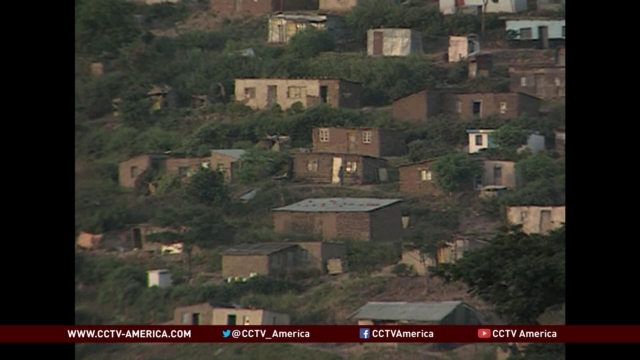When South Africa’s white-minority rule, known as apartheid, ended in 1994, the economy began to rebound. International sanctions were lifted and the country’s economic growth tripled. Presently South Africa is one of only 4 African countries ranked as an upper-middle income economy by the World Bank. But many South Africans are still waiting to share in the country’s prosperity. CCTV’s Rachelle Akuffo reports.

South African Poverty: 20 Years Later
When South Africa's white-minority rule, known as apartheid, ended in 1994, the economy began to rebound. International sanctions were lifted and the country's economic growth tripled. Presently South Africa is one of only 4 African countries ranked as an upper-middle income economy by the World Bank. But many South Africans are still waiting to share in the country's prosperity. CCTV's Rachelle Akuffo reports.The South Western townships are known as Soweto. Home to South Africa’s anti-apartheid pioneers like Nelson Mandela and Desmond Tutu – and the scene of some of South Africa’s most violent political clashes. Townships were settlements on the outskirts of cities, where black citizens were forced to live under apartheid. For those old enough to remember, the changes have been drastic.
Zodwa Kubheka, Soweto resident says: “Our people, they were running at night. The whites, they are shooting them. One man has died in my yard. But today I think everything is right, because you can’t see that. Here in Soweto now, you’re a hundred percent better.”
But others are still waiting to enjoy the economic gains the country has made since apartheid ended. Around 40% of South Africans still live in townships.
Many residents can’t afford to live anywhere else.
Milton Mvelase shares this one bedroom dormitory with his family and says little has changed for his family. He says: “We don’t know freedom here. Our lives have not changed. We don’t have toilets or running water. We’re using paraffin for cooking and we’re lighting candles.”
Soweto is one of many areas seeing growing inequality. Against the backdrop of golf courses, luxury hotels and upscale shopping malls – many still contend with high crime rates, poverty and a lack of job opportunities. Frustrated, many are trying to get the government’s attention – sometimes through violence.
Reuben Mohulatsi, a protester, claims: “We have to, we don’t have a choice. If ever this government is not ready to listen to us, then violence maybe will make them listen.”
While on the campaign trail, South African President Jacob Zuma claimed his ruling party, the African National Congress, has the answer. He says: “We have done a lot in twenty years but we still have some way to go to eradicate poverty, inequality and unemployment. Fortunately we have a plan.”
Part of that plan includes a pledge to create 6 million job opportunities over the next five years. But details of any monetary policy are unlikely to come out until the final votes of the May 7th elections have been counted.
 CGTN America
CGTN America
